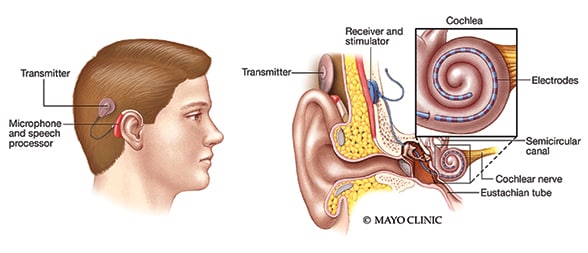Jan. 18, 2019
Identification and treatment of hearing impairment should occur as early as possible, including cochlear implantation for children as young as 6 months who have moderate to profound hearing loss.
"Increasing amounts of data show that the earlier you implant, the better the speech and language outcomes are, in general. We usually implant both ears, and we're implanting people with more residual hearing," says Colin L. W. Driscoll, M.D., an otorhinolaryngologist at Mayo Clinic Children's Center in Rochester, Minnesota.
Cochlear implant delivers sound signals directly to the auditory nerve

Cochlear implant delivers sound signals directly to the auditory nerve
Sound signals are captured by the microphone, processed and then transmitted to the internal receiver. It converts the sound signals into electrical impulses, which are then transmitted to an electrical array in the cochlea.
A cochlear implant delivers sound signals directly to the auditory nerve, bypassing damaged portions of the ear. The sound signals are captured by a processor fitted behind the ear and transmitted to a receiver implanted under the skin behind the ear. The receiver sends the signals to electrodes implanted in the cochlea, which stimulate the auditory nerve.
Even in children who have some residual hearing, cochlear implantation can significantly improve the quality of sound, optimizing language development. "Although hearing aids may provide some sound for people with residual hearing, the sound quality isn't nearly as good as what we can give with a cochlear implant," Dr. Driscoll says. "If children aren't meeting their language milestones with amplification, cochlear implantation should be strongly considered earlier rather than later. It's an established technique with a very good track record."
Early management requires early diagnosis. Yet despite increased screening, Mayo Clinic continues to see children with hearing loss that wasn't diagnosed or treated early. Due to the critical time window for auditory language development, delays can have a lifelong impact.
"If there's any concern about a child's hearing or speech and language development, the child should have a hearing test," Dr. Driscoll says. "Recognizing hearing loss and referring the child early is very important."
Managing complex conditions
Mayo Clinic Children's Center has successfully performed cochlear implantation for children with a range of hearing-loss etiologies. Mayo Clinic was one of the first centers to use cochlear implants to treat children with auditory neuropathy spectrum disorder, which causes about 10 percent of cases of congenital sensorineural hearing loss.
"Some kids with auditory neuropathy have a lot of hearing, but the sound quality is terrible. With cochlear implants we can often restore clarity," Dr. Driscoll says.
Mayo Clinic Children's Center also has experience treating children with progressive hearing loss due to conditions such as an inner ear malformation or cytomegalovirus (CMV). "We have developed new protocols for monitoring children with CMV," Dr. Driscoll says.
About half of severe congenital hearing loss has a genetic cause. At Mayo Clinic Children's Center, a pediatric geneticist helps manage care for these children. Identifying a genetic cause for hearing impairment can spur investigation for associated vision and renal problems. "There's great value in understanding why a child has severe hearing loss. Knowing the origin allows us to not worry about other potential causes," Dr. Driscoll says.
For all children who undergo cochlear implantation, Mayo Clinic Children's Center provides subspecialized care from clinical genomicists, pediatric neurologists, ophthalmologists and rheumatologists as needed. "We have a seamless system that allows a team of experts to communicate with one another and work together to really understand children and all their health problems," Dr. Driscoll says. "That's what allows us to provide optimal care for children with complex conditions."